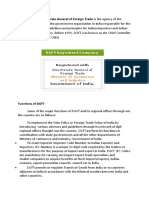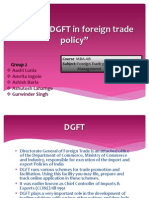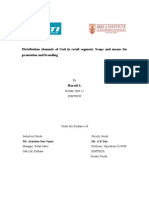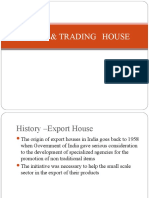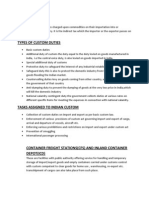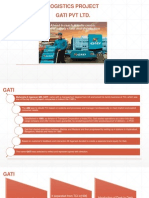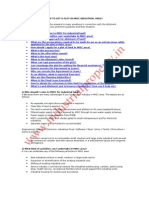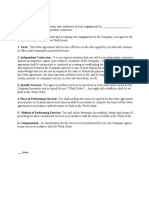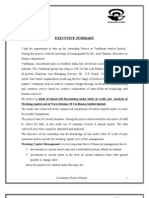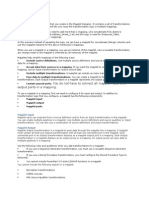DGFT Role
DGFT Role
Uploaded by
Rajesh JagadeesanCopyright:
Available Formats
DGFT Role
DGFT Role
Uploaded by
Rajesh JagadeesanOriginal Description:
Original Title
Copyright
Available Formats
Share this document
Did you find this document useful?
Is this content inappropriate?
Copyright:
Available Formats
DGFT Role
DGFT Role
Uploaded by
Rajesh JagadeesanCopyright:
Available Formats
Chapter-1
Role, Functions and Organisational Set Up
The mandate of the Department of Commerce
is regulation, development and promotion of
Indias international trade and commerce through
formulation of appropriate international trade
& commercial policy and implementation of
the various provisions thereof. The basic role of
the Department is to facilitate the creation of
an enabling environment and infrastructure for
accelerated growth of international trade. The
Department formulates, implements and monitors
the Foreign Trade Policy (FTP) which provides
the basic framework of policy and strategy to be
followed for promoting exports and trade. The
Trade Policy is periodically reviewed to incorporate
changes necessary to take care of emerging
economic scenarios both in the domestic and
international economy. Besides, the Department
is also entrusted with responsibilities relating to
multilateral and bilateral commercial relations,
Special Economic Zones, state trading, export
promotion and trade facilitation, and development
and regulation of certain export oriented
industries and commodities. The subjects under
the administrative control of the Department are
at Annexure 1.1.
Special Economic Zones (SEZs), Joint Study Groups
(JSGs) etc, two posts each of Joint Secretaries and
Directors were created in the Department during
2008-09.
The Department is functionally organized into the
following eight Divisions:
1. Administration and General Division
2. Finance Division
3. Economic Division
4. Trade Policy Division
5. Foreign Trade Territorial Divisions
6. State Trading & Infrastructure Division
7. Supply Division
8. Plantation Division.
The various offices/ organizations under the
administrative control of the Department are: (A)
three Attached Offices, (B) eleven Subordinate
Offices, (C) ten Autonomous Bodies, (D) five Public
Sector Undertakings, (E) Advisory Bodies, (F)
fourteen Export Promotion Councils and (G) other
Organizations. A complete list of these offices/
organizations along with the postal addresses is
given at Annexure 1.2.
The broad organizational set up and major role and
functions of these bodies are discussed below:
The Department is headed by a Secretary who is
assisted by an Additional Secretary & Financial
Adviser, three Additional Secretaries, thirteen Joint
Secretaries and Joint Secretary level officers and a
number of other senior officers. Keeping in view the
large increase in workload in matters related to the
World Trade Organization (WTO), Regional Trade
Agreements (RTAs), Free Trade Agreements (FTAs),
(A) Attached Offices
(i) Directorate General Of Foreign Trade
(Dgft)
Directorate General of Foreign Trade (DGFT) is an
attached office of the Ministry of Commerce and
Industry and is headed by Director General of
Annual Report 2011-12
Foreign Trade. Right from its inception till 1991,
when liberalization in the economic policies of the
Government took place, this organization has been
essentially involved in the regulation and promotion
of foreign trade through regulation. Keeping in line
with liberalization and globalization and the overall
objective of increasing of exports, DGFT has since
been assigned the role of facilitator. The shift was
from prohibition and control of imports/exports
to promotion and facilitation of exports/imports,
keeping in view the interests of the country.
This Directorate, with headquarters at New Delhi,
is headed by the Director General of Foreign Trade.
It is responsible for implementing the Foreign
Trade Policy with the main objective of promoting
Indias exports. The DGFT also issues licenses
to exporters and monitors their corresponding
obligations through a network of 35 regional offices
and extension counters at Indore and Srinagar.
The regional offices are located at the following
places:-
2.
Amritsar
3.
Bengaluru
4.
Bhopal
5.
Chandigarh
6.
Chennai
7.
Coimbatore
8.
Cuttack
9.
Dehradun
10.
Ernakulam (Cochin)
11.
Guwahati
12.
Hyderabad
13.
Jaipur
14.
Jammu
15.
Kanpur
16.
Kolkata
17.
Ludhiana
18.
Madurai
19.
Moradabad
20.
Mumbai
21.
Nagpur
22.
New Delhi
23.
Panaji (Goa)
24.
Panipat
26.
Puducherry
27.
Pune
28.
Raipur
29.
Rajkot
30.
Shillong
31.
Surat
32.
Thiruvanthapuram
33.
Varanasi
34.
Visakhapatnam
35.
Vadodara
(ii) Directorate General of Supplies and
Disposals (DGS&D)
The DGS&D, with headquarters at New Delhi,
is headed by a Director General. It functions as
the executive arm of the Supply Division of the
Department of Commerce for conclusion of Rate
Contracts for common user items, procurement
of stores, consultancy etc. It has three Regional
Supply Offices located at Chennai, Mumbai and
Kolkata. DGS&D is in the process of opening a new
Regional Supply Office at Hyderabad. The functions
of DGS&D are carried out through its functional
wings & supporting service wings. The functional
wings are the Supply Wing and the Quality
Assurance wing. The supporting service wing
includes Administration, Vigilance, Complaints
and Public Relations, Planning and Co-ordination,
Internal Work Study, Management Information
Services, Litigation, etc.
S.No. Regional Office S.No. Regional Office
Ahemdabad
Patna
All regional offices provide facilitation to exporters
in regard to developments in International Trade
i.e. WTO agreements, Rules of Origin and antidumping issues, etc to help exporters in their
import and export decisions in an internationally
dynamic environment.
ORGANISATIONAL SET-UP
25.
The Supply Wing has commodity-wise Purchase
Directorates such as Information Technology,
Electrical Stores, Mechanical Engineering,
Automobiles, Steel & Cement, Structural
Engineering, Hardware, Workshop & Machine
Tools, Wool & Leather, Paper & Paper products,
Oil & Chemicals. The handling of commodity wise
CHAPTER-1
Role, Functions and Organisational Set Up
work facilitates maintenance of a data bank on
prices, vendors, specifications, market trends, etc.
At present, DGS&D deals with 222 valid R/C. (Rate
Contract) items. There are 29 outlying offices,
out of which 25 Offices/ Subcenters are Quality
Assurance Wing (including Headquarters) spread
all over the country.
Development of e-tendering and post tendering
modules for specialised items viz. Cement,
Automobile Items, Industrial Gases and Spares
are under development and are expected to be
operational by 31st Jan, 2012. Development of
the complete e-payment module including debit
adjustment with DDOs and integration with CGAs
e-Lekha is expected to be operational by 31st Mar,
2012.
DGS&D e-PROCUREMENT PROJECT
The DGS&D has developed a comprehensive
e-procurement package encompassing every
aspect of its procurement activity. Implemented
through NIC by a customised web-based
application software, the package is nationally
operated involving DGS&D HQrs, its three regional
offices and twenty seven field offices. DGS&Ds
e-Procurement Application is accessed by around
3,000 Central Government users through exclusive
user IDs and passwords for online placement of
Supply Orders against Rate Contracts.
Tenders relating to generalized items (Approx. 70%
of Rate Contracts), received after 15th Nov, 2011
are being submitted and processed-electronically
and online. Thus, DGS&D has almost fully migrated
from manual mode to online mode from 15th Nov,
2011.
(iii) Directorate General of Anti-Dumping &
Allied Duties (DGAD)
The Directorate General of Anti-Dumping &
Allied Duties was constituted in April, 1998 and is
headed by the Designated Authority of the level of
Additional Secretary to the Government of India
who is assisted by a Joint Secretary and an Adviser
(Cost). In addition, there are twelve Investigating
and Costing Officers to conduct investigations.
The Directorate is responsible for carrying out
investigations and recommending, where required,
under the Customs Tariff Act, the amount of antidumping duty/ countervailing duty on the identified
articles as would be adequate to remove injury to
the domestic industry.
Packages have already been developed and
implemented for Registration of Vendors,
Store coding, Pre bid Meetings, Finalization of
specifications (Technical Particulars), Issue of
Tender Notice/ Tender enquiry, Bid submission/
Bid opening/ Evaluation of Bids for common
generalized items, Award of Rate Contracts,
Supply Order, Inspection Notes, Dispatch Details
by Vendors, Receipt Details by Consignees, Bill
submission etc. Intensive training is being imparted
to DGS&D Officials as well as to all the Vendors/
DDOs across the country as the Vendors and DDOs
also need to be trained to operate the system.
(B) Subordinate Offices
(i) Directorate General of Commercial
Intelligence and Statistics (DGCI&S)
The project has increased transparency, improved
efficiency and instilled confidence among stake
holders in the procurement processes and is
expected to bring in significant savings to the
exchequer by developing a fully net-worked
environment where all the tendering and rate
contracting work will be done online/electronically
through a web enabled software.
The Directorate General of Commercial Intelligence
& Statistics (DGCI&S) is the premier organization
of Govt. of India for collection, compilation and
dissemination of Indias trade statistics and
commercial information. This Directorate, with
its office located at Kolkata, is headed by the
Annual Report 2011-12
Director General. It is entrusted with the work of
collecting, compiling and publishing/disseminating
trade statistics and various types of commercial
information required by the policy makers,
researchers, importers, exporters, traders as well
as overseas buyers. DGCI&S collects the basic data
from different customs formations in the form of
DTR (Daily Trade Return) and then processes and
compiles it using state-of-the-art technology. The
foreign trade data generated by the Directorate
are disseminated through (i) Monthly Press
Release brought out every month by the Ministry
of Commerce and Industry, (ii) Monthly Foreign
Trade Statistics of India by Principal Commodities
& Countries, (iii) Monthly Statistics of Foreign
Trade of India (Import & Export), and (iv) Quarterly
Statistics of Foreign Trade of India by Countries. It
also brings out an Assessment Report on Indias
Foreign Trade by Air, every year. As far as ancillary
statistics is concerned, DGCI&S also compiles
and publishes on regular basis the Inland Trade
Statistics covering inter-state movements of goods
by rail, river and air, Statistics on Indias customs
and excise revenue collections (according to the
tariff heads), Shipping Statistics, Inland Coastal
Trade Statistics and Selected Statistics of Foreign
Trade of India. The Directorate is conducting two
pilot surveys - one on trade in health services and
the other on education services in the current
financial year under the technical guidance of an
expert committee constituted by the CSO. Attempts
are on in consultation with the CSO and the states
to develop a suitable methodology for creating
a database on interstate movement of goods by
road.
India Trade Journal, a weekly publication, is the
premier publication of DGCI&S. The dynamic pages
of the DGCI&S website www.dgciskol.nic.in are
mainly for online data transmission. DGCI&S has
recently shifted to its new building at Anandapur,
near E.M. Bye Pass, Kolkata in October 2010.
(ii) Office of Development Commissioner of
Special Economic Zones (SEZs)
The main objectives of the SEZ Scheme are
generation of additional economic activity,
promotion of exports of goods and services,
promotion of investment from domestic and foreign
sources, creation of employment opportunities
along with the development of infrastructure
facilities. All laws of India are applicable in SEZs
unless specifically exempted as per the SEZ Act/
Rules. Each Zone is headed by a Development
Commissioner and is administered as per the SEZ
Act, 2005 and SEZ Rules, 2006. Units may be set up
in the SEZ for manufacturing, trading or for service
activity. The units in the SEZ have to be net foreign
exchange earners but they are not subjected to any
predetermined value addition or minimum export
performance requirements. Sales in the Domestic
Tariff Area from the SEZ units are treated as if
the goods are being imported and are subject to
payment of applicable customs duties.
(iii) Pay and Accounts Office (Supply)
The payment and accounting functions of Supply
Division, including those of DGS&D, are performed
by the Chief Controller of Accounts (CCA) under the
Departmentalized Accounting System. Payment to
suppliers across the country are made through this
organization at its headquarters in New Delhi and
regional offices situated in Kolkata, Mumbai and
Chennai. Internal Audit functions are also carried
out in respect of 9 CDDO and 16 non-CDDO situated
at various locations in the country.
The Directorate brings out a number of publications
on, inter alia; inland and coastal trade statistics,
revenue statistics, shipping & air cargo statistics etc,
which are utilized by the Government Departments
as well as by trading communities and researchers.
CHAPTER-1
Role, Functions and Organisational Set Up
(iv) Pay and Accounts Office (Commerce &
Textiles)
(ii) Rubber Board
The Rubber Board was set up under Section
(4) of the Rubber Act, 1947. The Chairperson is
the Chief Executive Officer of the Board and its
headquarters is located at Kottayam in Kerala. The
Board is responsible for the development of the
rubber industry in the country by way of assisting
and encouraging scientific, technical and economic
research; providing training to growers in improved
methods of planting, cultivation, manuring,
spraying, harvesting; improving processing and
marketing of rubber; and collecting statistics
from the owners of estates, dealers, processors
and rubber product manufacturers. It is also the
function of the Board to secure better working
conditions and provide/improve amenities and
incentives to rubber plantation workers. The Rubber
Production Department of the Board has five Zonal
Offices, forty-one Regional Offices, a number of
Field Stations/ Rubber Development Centres and
Regional Nurseries. The Rubber Research Institute
of India is also located at Kottayam and has ten
research/breeding stations in different parts of the
country.
The Pay and Accounts Office, common to both
the Department of Commerce and the Ministry of
Textiles, is responsible for the payment of claims,
accounting of transactions and other related
matters through the four Departmental Pay &
Accounts Offices in Delhi, two in Mumbai, two in
Kolkata and two in Chennai. These Departmental
Pay and Accounts Offices are controlled by the
Principal Accounts Office at Delhi with the Chief
Controller of Accounts (CCA) as the Head of the
Department of the Accounts Wing.
(C) Autonomous Bodies
(i) Coffee Board
The Coffee Board is a statutory organisation
constituted under Section (4) of the Coffee Act,
1942 and functions under the administrative
control of the Ministry of Commerce and Industry,
Government of India. The Board comprises 33
Members including the Chairperson, who is the
Chief Executive and functions from Bangalore.
The remaining 32 Members representing various
interests are appointed as per provisions under
Section 4(2) of the Coffee Act read with Rule 3 of
the Coffee Rules, 1955. The Board is mainly focusing
its activities in the areas of research, extension,
development, quality upgradation, economic &
market intelligence, external & internal promotion
and labour welfare. The Board has a Central Coffee
Research Institute at Balehonnur (Karnataka) and
Regional Coffee Research Stations at Chettalli
(Karnataka), Chundale(Kerala), Thandigudi (Tamil
Nadu), R.V.Nagar (Andhra Pradesh) and Diphu
(Assam), and a bio-technology centre at Mysore,
apart from the extension offices located in coffee
growing regions of Karnataka, Kerala, Tamil Nadu,
Andhra Pradesh, Orissa and North Eastern Region.
(iii) Tea Board
The Tea Board is an autonomous body under the
Ministry of Commerce & Industry, Government
of India, set up as a statutory body on 1st April,
1954 as per provision under Section (4) of the Tea
Act, 1953. It is an apex body, which looks after the
overall interests of the tea industry. The Board is
headed by a Chairperson and there are other 30
Members representing various interests pertaining
to tea industry. The Boards Head Office is situated
in Kolkata and there are 16 regional/ sub-regional
offices throughout India. It has also three overseas
offices at London, Moscow and Dubai whose
activities are mostly promotional in nature. Tea
Boards functions and responsibilities include
measures for development of the tea industry,
Annual Report 2011-12
extending financial and technical assistance to the
tea growers, manufacturers and producers, export
promotion and domestic generic promotion,
regulating and controlling different marketing
activities including that of tea auctions, facilitating
R&D activities, market liaison, assistance to labour
welfare activities, maintenance of statistical data
etc.
spices listed in the schedule of the Spices Board
Act, 1986. The primary functions of the Board
include production development of small and
large cardamom; development, promotion and
regulation of export of spices. The Board is also
responsible for implementing programmes for
development of spices in North Eastern region and
organic spices in the country. The activities of the
Board include issue of certificate of registration
as exporter of spices; undertaking programmes
and projects for promotion of export of spices like
setting up of spices parks, support of infrastructure
improvement in spices processing, assisting and
encouraging studies and research on medicinal
properties of spices, development of new products,
improvement of processing, grading and packaging
of spices; striving towards stabilization of prices of
spices for export and controlling & upgrading quality
for export (including setting up of regional quality
evaluation labs and training centres). With regard
to cardamom, the domestic marketing is facilitated
through e-auctions by registered auctioneers and
dealers. The research activities on cardamom are
also done by the Spices Board.
(iv) Tobacco Board
The Tobacco Board was constituted as a statutory
body on 1st January, 1976 under Section (4) of
the Tobacco Act, 1975. The Board is headed by a
Chairman with its headquarters at Guntur, Andhra
Pradesh and is responsible for the development of
the tobacco industry. At present, the activities of
Board are restricted to production and marketing
of Virginia tobacco only. However, the Board is
performing the function of export promotion in
respect of all varieties of tobacco.
The Tobacco Board provides a comprehensive
package of support and extension services to
farmers through:
Supply of essential inputs including
fertilizers and extending subsidies on
inputs.
Organising crop and input loans to
growers at lower rates of interest.
Improving yield & quality of tobacco
through implementing several extension
and development programmes.
Transfer of technology for improving
productivity and quality of the tobacco
leaf.
(vi) The Marine Products Export
Development Authority (MPEDA)
The Marine Products Export Development Authority
was set up as a Statutory Body in 1972 under an Act
of Parliament (No.13 of 1972). The Authority, with
its headquarters at Kochi and field offices in all the
maritime States of India, is headed by a Chairperson.
The Authority is responsible for development of
the marine industry with special focus on marine
exports. Besides, it has Trade Promotion Offices in
Tokyo (Japan) and New York (USA).
(v) Spices Board
The Spices Board was constituted as a statutory
body on 26th February, 1987 under Section (3) of
the Spices Board Act, 1986. The Board is headed
by a Chairperson with its Head Office at Kochi and
is responsible for the development of cardamom
industry and promoting the export of all the 52
(vii) Agricultural and Processed Food
Products Export Development Authority
(APEDA)
The Agricultural and Processed Food Products
Export Development Authority (APEDA) was
CHAPTER-1
Role, Functions and Organisational Set Up
(viii) Export Inspection Council (EIC)
established by the Government of India under
the Agricultural and Processed Food Products
Export Development Authority Act passed by the
Parliament in December, 1985. The Authority,
with its headquarters at New Delhi, is headed by
a Chairperson. APEDA has been serving the agriexport community for 25 years and to reach out to
the exporters in different parts of the Country. In
addition to five Regional Offices, APEDA has set up
13 Virtual Offices at Thiruvananthapuram(Kerala),
Bhubaneshwar (Orissa), Srinagar (J & K), Chandigarh,
Imphal (Manipur), Agartala (Tripura), Kohima
(Nagaland), Chennai (Tamil Nadu), Raipur
(Chhatisgarh), Ahmedabad (Gujarat), Bhopal
(Madhya Pradesh), Lucknow (Uttar Pradesh)
and Panaji, (Goa). Apeda has been entrusted
with the responsibility of export promotion and
development of 14 agricultural and processed food
product groups listed in the Schedule to the APEDA
Act. In addition to this APEDA has been entrusted
with the responsibility to monitor the import of
sugar as well.
The Export Inspection Council was set up as a
Statutory Body on 1st January, 1964 under Section
3 of the Export (Quality Control and Inspection) Act,
1963 to ensure sound development of export trade
of India through quality control and inspection and
for matters connected therewith. The Council is
an advisory body to the Central Government, with
its office located at New Delhi and is headed by a
Chairperson. The Executive Head of the EIC is the
Director of Inspection & Quality Control who is
responsible for the enforcement of quality control
and compulsory pre-shipment inspection of various
commodities meant for export and notified by the
Government under the Export (Quality Control and
Inspection) Act, 1963. The Council is assisted in its
functions by the Export Inspection Agencies (EIAs),
which are field organizations located at Chennai,
Delhi, Kochi, Kolkata and Mumbai and have stateof-art and accredited laboratories with the required
logistic support for quality certification activities.
These Agencies have a network of twenty-nine
sub-offices and laboratories located at different
ports or major industrial centres to back up the preshipment inspection and certification activities.
APEDA has been actively engaged in the
development of markets besides upgradation of
infrastructure and quality to promote the export of
agro products. In its endeavour to promote agro
products, APEDA provides financial assistance to
the registered exporters under its Schemes for
Market Development, Infrastructure Development,
Quality Development, Research & Development
and Transport Assistance.
(ix) Indian Institute of Foreign Trade (IIFT)
The Indian Institute of Foreign Trade was registered
in May, 1963 under the Societies Registration Act,
1860. The Institute with its head office at New
Delhi and one regional branch at Kolkata, is headed
by a Director. The Institute has been conferred
Deemed University status in 2002 and is engaged
in the following activities:
Conducting academic courses leading
to award of Ph.D degree and degrees/
diploma/certificate in International
Business,
Industrial
Marketing,
Capital & Financial Market and Export
Management.
During the year 2009, APEDA has been empowered
by an amendment to the APEDA Act, 1985 to
undertake measures as may be prescribed by the
Central Government the registration and protection
of Intellectual Property Rights in respect of special
products in India or outside India. Accordingly,
APEDA has initiated the process for registration of
Basmati Rice as Geographical Indications (GI) by
filling an application with GI Registry, Chennai.
Annual Report 2011-12
Training of personnel in international
trade.
Organizing research on issues in foreign
trade, marketing research, area surveys,
commodity surveys, market surveys; and
Dissemination of information arising
from its activities relating to research and
market studies.
sugar, edible oils etc.) into India and developing
exports of a large number of items from India.
The core strength of STC lies in handling exports/
imports of bulk agro commodities. However over
the years, STC has also diversified into exports
of steel raw materials, gold jewellery, iron ore,
molasses and imports of bullion, hydrocarbons,
minerals, metals, ores, fertilizers, petro-chemicals,
etc. This has helped STC to achieve record breaking
performances in the recent year, STC is today
able to structure and execute trade deals of any
magnitude, as per the specific requirement of its
customers.
(x) Indian Institute of Packaging (IIP)
The Indian Institute of Packaging (IIP) is an apex
body in the field of Packaging and was registered
under Society Registration Act, 1860 in the year
1966 by the packaging fraternity with the financial
support of the Ministry of Commerce & Industry,
Government of India.
STCL Ltd., having its headquarters at Bangalore,
is a subsidiary of STC. It was initially established
in 1982 as Cardamom Trading Corporation Ltd.,
a Government of India undertaking under the
Ministry of Commerce & Industry. The company
diversified its trading activities from cardamom to
spices to become Spices Trading Corporation Ltd.,
in 1987. With globalization and opening of trade
world over, the Spices Trading Corporation Ltd.
was renamed as STCL Ltd. STCL became a wholly
owned subsidiary of the State Trading Corporation
of India Ltd. in 1999. STCL is involved in trading of
spices, value added spice products, agricultural
commodities, fertilizers and pesticides. The CMD
of STC is the Chairman of STCL Ltd.
The primary objective of the Institute is to stimulate
consciousness of good packaging; undertake,
promote, study research and development in
packaging and package design for export promotion,
provide short-term and long-term educational and
training programme in packaging as well as to
organize seminars, conferences in collaboration
with other Ministries, Govt. Departments and
industry associations.
The Institute has since opened its branches at Delhi,
Kolkata, Chennai, and Hyderabad. The Institute has
also planned to set up its branches at Ahmadabad
and North East under the 12th five year plan.
(ii) MMTC Limited
(D) Public Sector Undertakings (PSUs)
The MMTC Limited (Minerals and Metals Trading
Corporation) was created in 1963 as an individual
entity on separation from State Trading Corporation
of India Ltd. primarily to deal in exports of minerals
and ores and imports of non-ferrous metals. In
1970, MMTC took over imports of fertilizer raw
materials and finished fertilizers. Over the years
import and export of various other items like steel,
diamonds, bullion, etc. were progressively added
to the portfolio of the company. Keeping pace with
(i) State Trading Corporation of India
Limited (STC)
STC was set up on 18th May, 1956, primarily with
a view to undertake trade with East European
Countries and to supplement the efforts of private
trade and industry in developing exports from
the country. STC has played an important role in
countrys economy by arranging imports of essential
items of mass consumption (such as wheat, pulses,
CHAPTER-1
Role, Functions and Organisational Set Up
the national economic development, MMTC has
grown over the years to become the largest trading
organization in India.
proceeds due to commercial or political causes and
(b) different types of guarantees to banks and other
financial institutions to enable them to extend
credit facilities to exporters on liberal basis.
(iii) PEC Limited
(v) India Trade Promotion Organization
(ITPO)
The PEC Ltd (Project and Equipment Corporation
of India) was carved out of the STC in 197172 to take over the canalized business of STCs
railway equipment division, to diversify into
turn-key projects especially outside India and to
aid and assist in promotion of exports of Indian
engineering equipment. With effect from 23rd
May, 1990, PEC became a subsidiary of the then
newly formed Holding Company, Bharat Business
International Ltd. Thereafter, from 27th March,
1991, PEC became an independent company
directly owned by Government of India. The main
functions of PEC Ltd. includes export of projects,
engineering equipment and manufactured goods,
defence equipment & stores; import of industrial
raw materials, bullion and agro commodities;
consolidation of existing lines of business and
simultaneously developing new products and new
markets; diversification in export of non-engineering
items eg. coal and coke, iron ore, edible oils, steel
scraps, etc.; and structuring counter trade/ special
trading arrangements for further exports.
The Trade Fair Authority of India (TFAI) and the
Trade Development Authority (TDA) were merged
together in 1992, and the new organization was
renamed as India Trade Promotion Organisation
(ITPO). ITPO is the premier trade promotion agency
of India and provides a broad spectrum of services to
trade and industry so as to promote Indias exports.
These services include organisation of trade fairs
in India and abroad, Buyer-Seller Meets, Contact
Promotion Programmes apart from information
dissemination on products and markets. With its
Headquarters at Pragati Maidan, New Delhi and
regional offices at Bangalore, Chennai, Kolkata and
Mumbai, ITPO ensures representative participation
of trade and industry from different regions of the
country in its events in India and abroad
(E) Export Promotion Councils (EPCs)
Presently, there are fourteen Export Promotion
Councils under the administrative control of the
Department of Commerce. Names and addresses
of these Councils are given in Annexure 1.2. These
Councils are registered as non-profit organizations
under the Companies Act/ Societies Registration
Act. The Councils perform both advisory and
executive functions. The role and functions of these
Councils are guided by the Foreign Trade Policy,
2009-14. These Councils are also the registering
authorities for exporters under the Foreign Trade
Policy 2009-14.
(iv) Export Credit Guarantee Corporation of
India Limited (ECGC)
The Corporation was established in 1957 as the
Export Risk Insurance Corporation of India Ltd.
Keeping in view the wider role played by the
Corporation, the name was changed to Export
Credit Guarantee Corporation of India Ltd.
(ECGC). ECGC is the premier organization in the
country which offers credit risk insurance cover
to exporters, banks, etc. The primary objective of
the Corporation is to promote countrys exports by
covering the risk of export on credit. It provides:
(a) a range of insurance covers to Indian exporters
against the risk of non-realization of export
(F) Advisory Bodies
(i) Board of Trade (BOT)
The Board of Trade (BOT) was reconstituted on
16.07.2009 under the Chairmanship of Commerce
Annual Report 2011-12
& Industry Minister vide order No.01/94/180/438/
AM05/BOT/PC-V dated 16.07. 2009. The Board of
Trade, inter alia, advises the Government on policy
measures connected with the Foreign Trade Policy
in order to achieve the objectives of boosting
Indias trade.
The third meeting of the reconstituted Board
of Trade was held on 11.10.2011 to discuss the
following issues:
(a) Overview of global Trade;
(b) Policy measures to mitigate fallout of the
adverse scenario;
(c) Procedural simplification: specific suggestion,
if any; and
(d) Views on Strategy paper put out by Department
of Commerce.
organizations connected with export promotion.
It provides the content, direction and thrust to
Indias global export effort. It also functions as a
primary servicing agency to provide integrated
assistance to its members comprising professional
exporting firms holding recognition status granted
by the government, consultancy firms and service
providers. The Federation organizes seminars and
arranges participation in various exhibitions in
India and abroad. It also brings out FIEO News, for
creating awareness amongst its member exporters
and importers.
(ii) Indian Council of Arbitration (ICA)
The Indian Council of Arbitration, Indias premier
Arbitral Institution, is a society registered under
the Societies Registration Act, 1860 operating on
no profit basis, with its head office in New Delhi
and eight branches with a pan India network.
The organization originally established in 1965
promotes and administers the use of alternative
dispute resolution mechanisms in commercial
disputes.
Commerce, Industry and Textile Minister during
the meeting has informed that The National
Manufacturing Policy is under finalization wherein
lot of trust is being extended to industry to be
able to open big windows of opportunity for the
industry and creating integrated planned Mega
Industrial Township.
The main objectives of the Council are to promote
the knowledge and use of arbitration and provide
arbitration facilities for amicable and quick
settlement of commercial disputes with a view to
maintaining the smooth flow of trade, particularly
export trade on a sustained and enduring basis.
(ii) Inter-State Trade Council:
The Inter State Trade Council has been set up
to serve as a mechanism for institutionalized
dialogue between the Union and the States in
matters relating to trade facilitation and to create
a framework for making States partners in Indias
export effort.
The ICA undertakes many promotional activities
like conducting Conferences, Workshops, etc. It
also brings out quarterly, a compilation of articles
on Arbitration. Regular mailers are also sent to
corporates urging them for using the dispute
resolution clause of the ICA.
(G) Other Organizations
(i) Federation of Indian Export
Organizations (FIEO)
The Federation of Indian Export Organizations
set up in 1965, is an apex body of various export
promotion organizations and institutions with its
major regional offices at Delhi, Mumbai, Chennai
and Kolkata. The main objective of FIEO is to
render an integrated package of services to various
(iii) Indian Diamond Institute (IDI)
With the objective of enhancing the quality, design
and global competitiveness of the Indian jewellery,
the Indian Diamond Institute was established as
a society in 1978 with its office located at Surat.
10
CHAPTER-1
Role, Functions and Organisational Set Up
(v) National Centre for Trade Information
(NCTI)
The Institute is sponsored by the Department
of Commerce and patronized by the Gems and
Jewellery Export Promotion Council (GJEPC).
The National Centre for Trade Information (NCTI)
was incorporated on 31st March, 1995 as a
company under Section 25 of Companies Act, 1956.
The company started functioning w.e.f. March
1996. It has a Board of Directors for administration
of its affairs, which includes representatives
from Ministry of Commerce & Industry, National
Informatics Centre (NIC), Indian Institute of
Foreign Trade (IIFT), and Directorate General of
Commercial Intelligence & Statistics (DGCI&S),
India Trade Promotion Organisation (ITPO), Council
for Leather Exports (CLE), The Marine Products
Export Development Authority (MPEDA), PEC Ltd.,
Coir Board and ASSOCHAM.
The institute conducts various diploma and
other courses related to diamond & jewellery
trade and industry. It also offers the three year
diploma course on Diamond, Gem & Jewellery
Design & Manufacture. The Institute also provides
certification services for diamonds, colouredstones
and gold jewellery. IDI has a Gem Testing Laboratory,
which is ISO 9001:2008 certified. The Institute has
an R&D centre, duly recognised by the Scientific
& Industrial Research Organisation (SIRO) under
Ministry of Science & Technology, Government of
India. The Institute has been recognized world over
as a Diamond Certification and Grading Laboratory.
The Institute also has Sardar Vallabhbhai Patel
Centre of Jewellery Design and Manufacture
(SVJDM) & state-of-the-art IDI-City Centre
offering advanced courses in jewellery design and
manufacture.
The ITPO and NIC are co-promoters of the
company and have contributed a sum of ` 4.00
crore (` 2.00 crore each) as Corpus Fund in the
equity contribution of the company. The ITPO
provides fully furnished office space and the NIC
provides the software and hardware against their
equity contribution in kind. The Centre provides
value added information in the field of electronic
trading opportunities, live trade leads from World
Trade Point Federation (WTPF), trade data analysis
and organized export awareness seminars and
updating/uploading information on its website.
It has uploaded on its website 52 issues of Trade
Point-India containing approximately 250 trade
leads each week.
(iv) Footwear Design & Development
Institute (FDDI)
Footwear Design and Development Institute was
established in the year 1986 as a society under
the Societies Registration Act, 1860 with an
objective to train the professional manpower for
footwear industry. The Institute is an ISO:9001 and
ISO:14001 certified Institute, which conducts wide
range of long term and short term programmes in
the area of Retail Management, Fashion, Footwear
Merchandising, Marketing, Creative Design, and
Leather Goods & Accessories Design, etc. The
institute provides one stop solution to the footwear
industry and is internationally acclaimed as one
of the premier institutes in the area of footwear
design, technology and management.
(vi) Price Stabilization Fund Trust (PSF)
The Price Stabilization Fund (PSF) Scheme was
launched by Government of India in April 2003
against the backdrop of decline in international
and domestic prices of tea, coffee, rubber, and
tobacco causing distress to primary growers. The
growers of these commodities were particularly
affected due to substantial reduction in unit value
11
Annual Report 2011-12
realization for these crops, at times falling below
their cost of production. The objective of the
scheme is to safeguard the interests of the growers
of these commodities and provide financial relief
when prices fall below a specified level. The
scheme is being operationalized through the
Price Stabilization Fund Trust. As on 30 November
2011, deposits in the PSF Corpus Fund were
` 435.47 crore, out of which ` 432.88 crore was
contributed by GOI and ` 2.59 crore by growers by
way of entry fee.
A Personal Accident Insurance Scheme is also under
implementation by PSFT through Cholamandalam
M/s. General Insurance Co. Ltd. for the period
2011-12, which covers the growers in the sectors
of tea, coffee, rubber, tobacco and spices (chillies,
cardamom, ginger, turmeric and pepper) having
plantations upto 4 hectares only. The scheme
covers all plantation workers working on these
plantations regardless of the size of holdings. The
insurance cover is upto ` 1.00 lakh per person.
The premium of ` 22.06/- is shared between the
beneficiary and the PSF Trust in the ratio 50:50.
The target is 57.17 lakh growers and workers.
12
CHAPTER-1
Role, Functions and Organisational Set Up
Annexure-1.1
Work Allocated to Department of Commerce in accordance with the Allocation
of Business Rules, 1961
I. International Trade
International Trade and Commercial
Policy including tariff and non-tariff
barriers.
International Agencies connected with
Trade Policy (eg. UNCTAD, ESCAP, ECA,
ECLA, EEC, EFTA, GATT/WTO, ITC and
CFC).
International Commodity Agreements
other than agreements relating to
wheat, sugar, jute and cotton.
International Customs Tariff Bureau
including residuary work relating to the
Tariff Commission.
Projects & Equipment Corporation of
India Limited (PEC);
India Trade Promotion Organization
and its subsidiaries; and
Minerals
and Metals Trading
Corporation and its subsidiaries.
Production, distribution (for domestic
consumption
and
exports)
and
development of plantation crops, tea,
coffee, rubber, spices, tobacco and
cashew.
Processing and distribution for domestic
consumption and exports of instant tea
and instant coffee:
(a)
Tea Board
(b)
Coffee Board
(c)
Rubber Board
(d)
Spices Board
(e)
Tobacco Board.
II. Foreign Trade (Goods & Services)
All matters relating to foreign trade.
Import and Export Trade Policy and
Control excluding matters relating toImport of feature films;
Export of Indian films- both feature
length and shorts; and
Import and distribution of cinefilm (unexposed) and other goods
required by the film industry.
IV. Management of Certain Services
Cadre Management of Indian Trade Service
and all matters pertaining to training,
career planning and manpower planning
for the service.
Cadre Management of Indian Supply
Service and all matters pertaining to
training, career planning and manpower
planning for the service.
Cadre Management of Indian Inspection
Service and all matters pertaining to
training, career planning and manpower
planning for the service.
III. State Trading
Policies of state trading and performance
of organizations established for the
purpose and including
The State Trading Corporation of India
Limited and its subsidiary, STCL Ltd.
(formerly, Spices Trading Corporation
Ltd.) [excluding Handicrafts and
Handlooms Export Corporation
and Central Cottage Industries
Corporation; the Tea Trading
Corporation of India Limited, which
are no longer subsidiaries of STC];
V. Special Economic Zones
All matters relating to development,
operation and maintenance of special
economic zones and units in special
economic zones, including export and
import policy, fiscal regime, investment
13
Annual Report 2011-12
policy, other economic
regulatory framework.
policy
and
All organizations and institutions connected
with the provision of services relating to
the export effort including Export Credit and Export Insurance
including Export Credit Guarantee
Corporation Limited;
Export Inspection Council Standards
including Quality Control;
Directorate General of Commercial
Intelligence and Statistics; and
Free Trade-Zones.
Note: All fiscal concessions and policy issues
having financial implications are decided with
the concurrence of the Ministry of Finance or
failing such concurrence with the approval of the
Cabinet.
VI. Export Products and Industries and
Trade Facilitation
Gems and Jewellery.
Matters relating to Export Promotion
Projects and programmes for stimulating and
assisting the export efforts.
Board, Board of Trade and International
Trade Advisory Committee.
Matters relating to concerned Export
Promotion Councils/Export Promotion
Organizations.
Indian Institute of Foreign Trade and Indian
Institute of Packaging.
Indian Diamond Institute and Footwear
Design and Development Institute.
Coordination for export infrastructure.
Development and expansion of export
production in relation to all commodities,
products, manufacturers and semimanufacturers including agricultural produce within the
meaning of the Agricultural Produce
(Grading and Marking) Act, 1937 (1 of
1937);
marine products;
industrial products (engineering
goods, chemicals, plastics, leather
products, etc.);
fuels, minerals & mineral products;
and specific export oriented products
including plantation crops, etc.
but excluding jute products and
handicrafts.
VII. Attached and Subordinate Offices
Directorate General of Foreign Trade.
Directorate General of Supplies and
Disposals.
Directorate General of Anti-Dumping and
Allied Duties and related matters.
Directorate General of Commercial
Intelligence and Statistics.
VIII. Statutory Bodies
Marine Products Export Development
Authority.
Agricultural and Processed Food Products
Export Development Authority.
IX. Miscellaneous
Purchase and inspection of stores for Central
Government Ministries/ Departments including
their attached and subordinate offices and Union
Territories, other than the items of purchase and
inspection of stores which are delegated to other
authorities by general or special order.
14
CHAPTER-1
Role, Functions and Organisational Set Up
Annexure-1.2
Attached Offices/ Subordinate Offices/ Autonomous Bodies/ Public Sector
Undertakings/ Export Promotion Councils/Other Organizations under the
Department of Commerce
Attached Offices
1. Directorate General of Foreign Trade,
Udyog Bhavan, New Delhi 110 107.
10. Pay and Accounts Office (Commerce), Udyog
Bhavan, New Delhi - 110 107
2. Directorate General of Supplies & Disposals,
Jeevan Tara Building, Parliament Street, New
Delhi - 110 001.
11. Pay and Accounts Office (Supply), Akbar Road
Hutments, New Delhi.
Autonomous Bodies
3. Directorate General of Anti-Dumping & Allied
Duties, Udyog Bhavan, New Delhi 110 107.
1. Coffee Board, 1,Dr. B.R.
Veedhi,Bangalore 560001.
Subordinate Offices
Ambedkar
2. Rubber Board, Sub-Jail Road,P.B. No. 1122,
Kottayam - 686002.
1. Directorate General of Commercial
Intelligence and Statistics, No. 1, Council
House Street, Kolkata 700 001.
3. Tea Board, 14,BTM Sarani,Brabourne Road,
P.B. No.2172, Kolkata 700001.
2. Cochin Special Economic Zone, Administrative
Building, Kakkanad, Cochin 600 030.
4. Tobacco Board, P.B.No.322, Guntur 522004.
5. Spices Board,Sugandha Bhavan, N.H. Bypass,
PB-2277, Palarivattom P.O. Cochin 682025.
3. Falta Special Economic Zone, IInd MSO
Building, 4th Floor, R.No. 44, Nizam
Palace Complex, 234/4, AIC Bose Road,
Kolkata 700 020.
6. Marine Products Export Development
Authority,MPEDA
House,
Panampilly
Avenue,Kochi 682 036.
4. Madras Special Economic Zone, National
Highway 45, Tambaram, Chennai 600045.
Public Sector Undertakings
5. Kandla Special Economic Zone, Gandhidham,
Kachchh-3702309 (Gujarat)
1. State Trading Corporation of India Jawahar
Vyapar Bhavan Tolstoy Marg, New
Delhi - 110 001.
6. SEEPZ Special Economic Zone, Andheri (East),
Mumbai 400 096.
Subsidiary of STC
7. Visakhapatnam Special Economic Zone,
Administrative
Building,
Duvvada,
Visakhapatnam 530046.
1. STCL Ltd., 166/2, 13th Main
Vasanthnagar, Bangalore 560052
Road,
8. Noida Special Economic Zone, Surajpur Dadri
Road, Noida 201305
2. MMTC Ltd., Scope Complex, 7, Institutional
Area, Lodhi Road, New Delhi - 110 003.
9. Indore Special Economic Zone, Sector-III,
Pithampur (M.P.)
3. PEC Ltd.,Hansalaya 15, Barakhamba Road,
New Delhi - 110 001.
15
Annual Report 2011-12
4. Export Credit Guarantee Corporation of
India Ltd Express Towers, P.B. No. 373,
Nariman Point, Mumbai - 400 021
10. Sport Goods Export Promotion Council,
1-E/6, Swami Ram Tirth Nagar, Jhandewalan
Extension, New Delhi 110055.
5. India Trade Promotion Organization, Pragati
Maidan, Mathura Road, New Delhi - 110 001
11. Export Promotion Council for EOUs & SEZ
Units, 705, Bhikaji Cama Bhawan, Bhikaji
Cama Place, New Delhi-110066.
Export Promotion Councils
12. Pharmexcil, 101, AdityaTrade
Ameerpeth,Hyderabad-500 038,
Pradesh.
1. Chemexcil, Jhansi Castle, 4th Floor, 7,
Cooperage Road, Mumbai 400039.
2. CAPEXIL,Vanijya
Bhawan,International
Trade Facilitation Centre, 1/1 Wood Street,3rd
Floor, Kolkata 700016.
Centre,
Andhra
13. Indian Oil Seeds & Produce Export Promotion
Council, 78-79, Bajaj Bhawan, Nariman Point,
Mumbai 400 021.
3. Cashew Export Promotion Council of India,
P.B. No. 1709,Chittor Road, Ernakulam South,
Cochin - 682016.
14. Services Export Promotion Council 705,
Bhikaji Cama Bhavan, Bhikaji Cama Place,
New Delhi-110066.
4. Council for Leather Exports,No.1, CMDA
Tower II, III floor, Gandhi Irwin Road,Egmore,
Chennai - 600 008.
Other Organizations
1. Federation of Indian Export Organizations,
Niryat Bhawan, Rao Tula Ram Marg,Opp.
Army Hospital (Research & Referral), New
Delhi-110057.
5. EEPCVanijya Bhawan, International Trade
Facilitation Centre, 1st Floor, 1/1 Wood Street,
Kolkata 700016, West Bengal.
6. Gems & Jewellery Export Promotion Council,
Office No. AW 1010, Tower A, G Block, Bharat
Diamond Bourse,Next to ICICI Bank, BandraKurla Complex, Bandra East, Mumbai
400051.
2. Indian Council of Arbitration, Federation
House,Tansen Marg,New Delhi-110003
7. Project Exports Promotion Council of India
(PEPC), H-118, Himalaya House, 11th Floor,
23, Kasturba Gandhi Marg, New Delhi
110001.
4. Footwear Design & Development Institute,
A-10/A, Sector-24,Noida 201301,Gautam
Budh Nagar, Uttar Pradesh.
3. Indian Diamond Institute, Katargam, GIDC,
Sumul Dairy Road, P.B. No. 508, Surat-395008,
Gujarat.
5. National Centre for Trade Information,
NCTI
Complex,
Pragati
Maidan,
New Delhi - 110 001.
8. Plastics Export Promotion Council, Crystal
Tower, Ground Floor, Gundiwali Road
No.3, Opp. Sir M.V. Road, Andheri (East),
Mumbai 400069.
6. Price Stabilisation Fund Trust, Room No.2003.
20th Floor, Jawahar Vyapar Bhawan, Tolstoy
Marg, Connaught Place.
New Delhi - 110 001.
9. Shellac Export Promotion Council, Vanijya
Bhawan, International Trade Facilitation
Centre, 1/1 Wood Street, 2nd Floor,
Kolkata 700016.
16
JS(JSD)
TPD (Agriculture,
Safeguards, SPS, TBT,
TNC and General
Council, Centre
for WTO Studies,
Environment and
Labour, STEs,
BIP, Ministerial
Conference),
TPD(Coordination)
and Administration)
TPD services,
TRIPS, ITPO, and
New Convention
Centre Project and
Pharmexcil
FT(Africa),
FT(WANA)EP(MP),
Export Inspection
Administration &
Establishment
TPD(NAMA,
Textiles, Disputes
Settlement and
Rules, Trade
Facilitation,
Customs
valuation,
Import Licensing
Procedures, RMTR
and CRTA, APTA,
BIMSTEC, GSP,
Accession, CTD
and Aid for Trade
Initiative, Trade
& Transfer of
Technology, Trade
Debt and Finance,
Electronic
Commerce),
UNCTAD India
Project, UNCTAD
(including
GSTP), Small
Economics and
LDCs, Investment
(including TRIMS)
and Competition,
Government
Procurement,
IBSA and BRICs
JS(AS)
FFT(ASEAN),
ESCAPEFTCord.)and
RTI Act
JS(S)
FT
(Australia
and New
Zealand),
AntiDumping
and
subsidies,
Board of
Safeguards,
Trade
Promotion
(NCTI,
IIFT and
IIP), EP
(Service
Exports),
EP (ECS).
JS (JKD)
FT(SA/
SAARC/Iran),
E&MDA,
MAI, ECGC,
IBEF, Exim
Bank and EP
(OP)
JS(AM
FT (Europe),
Export
Promotion
Textiles
Coordination Parliament,
EP (Engg)
and GSI
India
JS(SC)
Additional Secretary (VJ)
EP(LSG),
SEZ, EOU/
FOI,
EP(G&J),
Kimberley
Process and
Vigilance
FT(LAC),
FT(NAFTA/
AM)
FT(CIS),
Infrastructure(ASIDE)
Scheme, States Cell, Trade
Finance Divison, Public
Grievances and Hindi
Division
JS(RC)
FT(NEA
including
China)
EP (Agri),
BiotechnologyEP (CAP)
and Supply
Division
JS (AKT)
Additional Secretary (MP)
EP(LSG),
Establishment1,E-IV, TA/TC,
Protocol, EP(LSG)
EP(G&J),Trade
Finance, Public
Grievances,
FT(Cord.), Kimberely Process.,
Adviser
Cost
(SKS)
Anti
Dumping
JS(MJ)
E&MDA,
ECGC,
IBEF,
Exim Bank,
MAI,
EP(CAP),
Pharmaceuticals
(Pharmaxcil)
TPD
AddlDG
(MB)
Information on
Foreign Trade
Statistics, Press
note on Indias
Foreign Trade,
Monitoring/
review
of Export
performance,
Monthly
summary
for Cabinet
Secretary,
Analysis of
reports, RFD,
Five Year
Plan and Mid
Term Review;
Coord. of
Annual Report,
Strategic Plan,
Strategy Paper,
Report to
CIM, Sectoral
studies on
Exports;
Selected
macroeconomic
indicators;
Advice on
economic
aspects of
globalisation,
WTO issues
and other
proposals.
EA(SD)
Joining
awaited
EA
Infrastructure, centre State Interaction on Exports
including States Cell,North East Cell, Foreign Trade (State
Trading), Foreign Trade (Minerals & Ores), Foreign Trade
(Europe including enlarged European Union), Special
Economic Zone, Export Oreinted Unit/Foreign Overseas
Investment, Foreign Investment Promotion Board (Export
Promotion), National Steering Committee on Organic
Product and Chairman EIC.
JS(A Saxena)
Anti Dumping (DGAD), EU Division
(excluding work relating to the India
EU BTIA and EFTA negotiations), Offset
Policy and RTI.
JS(AW)
Trade Policy Division (including Regional
Multilateral Trade Relations and United Nation
Conference on Trade and Development),
Pharmaceuticals (pharmexil) and India-EU BITA
and EFTA negotiations.
Finance, Budget & Accounts, Internal
Work Study Unit/Organization &
Management / Career Management
& Training, Market Development
Assistance, India Brand Equity Fund,
Trade Finance, Economic Division
JS(DSD)
Additional Secretary (RK)
Additional Secretary and Financial
Adviser (RSK)
Minister For Commerce, Industry and Textiles (Shri Anand Sharma)
Minister of State for Commerce & Industry (Shri Jyotiraditya M. Scindia)
Commerce Secretary (Dr. Rahul Khullar)
ORGANISATIONAL CHART OF DEPARTMENT OF COMMERCE
CHAPTER-1
Role, Functions and Organisational Set Up
17
You might also like
- IndiaFilings BrochureDocument11 pagesIndiaFilings BrochureAjit Sinha50% (2)
- Company Registration in IndiaDocument17 pagesCompany Registration in IndiaAavana CorporateNo ratings yet
- Planning and Preparation For ExportDocument13 pagesPlanning and Preparation For ExportRayhan AtunuNo ratings yet
- Bangladesh Exporter GuidelinesDocument27 pagesBangladesh Exporter GuidelinesBaki HakimNo ratings yet
- Logistics Question PaperDocument2 pagesLogistics Question PaperRajesh Jagadeesan100% (3)
- DGFT or Directorate General of Foreign Trade Is The Agency of TheDocument4 pagesDGFT or Directorate General of Foreign Trade Is The Agency of TheDharam ShahNo ratings yet
- DGFTDocument29 pagesDGFTyes456No ratings yet
- DGFTDocument156 pagesDGFTArul SakthiNo ratings yet
- Falcon Freight LINK PVT - LTD Custom House AgentDocument24 pagesFalcon Freight LINK PVT - LTD Custom House AgentfalconNo ratings yet
- Manual GapDocument24 pagesManual GapLindsay MezaNo ratings yet
- Waste Audit PresentationDocument13 pagesWaste Audit Presentationcgajendran_56098156No ratings yet
- SBI-SME-Application Form Term LoanDocument68 pagesSBI-SME-Application Form Term LoanSadaf Iqbal50% (2)
- Complaint Againtst Chawla ExportersDocument4 pagesComplaint Againtst Chawla ExportersNASLEEN KAURNo ratings yet
- Import & Export Documentations in International Trade - PPTX - Week - 3Document37 pagesImport & Export Documentations in International Trade - PPTX - Week - 3Kennedy HarrisNo ratings yet
- Inernship Report On Fauji Fertilizer CompanyDocument41 pagesInernship Report On Fauji Fertilizer CompanyAAdii50% (2)
- E-Way Bill MaricoDocument23 pagesE-Way Bill Maricodinesh kasnNo ratings yet
- Export Declaration Form With SDFDocument12 pagesExport Declaration Form With SDFsandeepgupta29No ratings yet
- 12 Steps To Starting A Business in India - BlogDocument5 pages12 Steps To Starting A Business in India - BlogSravaniNo ratings yet
- INDIA Indemnity LetterDocument1 pageINDIA Indemnity Letter007dcpNo ratings yet
- UD Service: Utilization DeclarationDocument7 pagesUD Service: Utilization DeclarationFaruk AhmedNo ratings yet
- Travel Industry ProfileDocument35 pagesTravel Industry ProfileRadhika Murarka100% (1)
- Posh ActDocument3 pagesPosh ActAbhay Raj Singh100% (1)
- Ethical Trading PolicyDocument3 pagesEthical Trading PolicyPaul SuciuNo ratings yet
- 11 Main Features of The Foreign Trade Policy of IndiaDocument4 pages11 Main Features of The Foreign Trade Policy of Indiarash4ever2uNo ratings yet
- Basics of Import ExportDocument5 pagesBasics of Import Exportprasad MeesalaNo ratings yet
- Export Costing & Pricing: A. K. Sengupta Former Dean IIFTDocument95 pagesExport Costing & Pricing: A. K. Sengupta Former Dean IIFTPrachi sharmaNo ratings yet
- Logistics IndustryDocument48 pagesLogistics IndustryTanu NigamNo ratings yet
- Export Procedure: The PreliminaryDocument34 pagesExport Procedure: The PreliminarySohel BangiNo ratings yet
- Star Export HouseDocument14 pagesStar Export Houseshishir09aug0% (1)
- HW To Import From China To IndiaDocument12 pagesHW To Import From China To IndiaAbhishek SinghNo ratings yet
- Gypsum Powder PDFDocument7 pagesGypsum Powder PDFPraful E. PawarNo ratings yet
- ESG Brochure March 2020Document16 pagesESG Brochure March 2020glenlcyNo ratings yet
- Tally 9.1 NotesDocument28 pagesTally 9.1 NotesAbdulhussain Jariwala100% (2)
- Role of Export Promotion Councils in IndiaDocument17 pagesRole of Export Promotion Councils in IndiaSarbeshwar Sahoo100% (1)
- Chemicals Industry PDFDocument19 pagesChemicals Industry PDFMelih AltıntaşNo ratings yet
- Example of Quotation Supply of Transport Services Nov 2012Document2 pagesExample of Quotation Supply of Transport Services Nov 2012Hari100% (1)
- Ultimate ESG GuideDocument25 pagesUltimate ESG GuidesabNo ratings yet
- Single Customs TerritoryDocument4 pagesSingle Customs TerritoryURAugandaNo ratings yet
- Bangladesh Importer Guidelines PDFDocument27 pagesBangladesh Importer Guidelines PDFMd Delowar Hossain MithuNo ratings yet
- CustomsDocument4 pagesCustomsgeorgehighsNo ratings yet
- Export Import Indenting C and F Agent TeDocument1 pageExport Import Indenting C and F Agent Teshinde abhijeetNo ratings yet
- Gati PVT LTDDocument19 pagesGati PVT LTDAniket Dasgupta100% (1)
- How To Get A Plot in Midc Industrial AreaDocument9 pagesHow To Get A Plot in Midc Industrial Areabakulharia100% (4)
- Export Certification AgenciesDocument14 pagesExport Certification AgenciespardeepNo ratings yet
- Import Procedure: Import Trade Control (I.T.C)Document11 pagesImport Procedure: Import Trade Control (I.T.C)HabibNo ratings yet
- Jet Propulsion ExamDocument1 pageJet Propulsion ExamNouman NadeemNo ratings yet
- Q2 AbDocument6 pagesQ2 AbDhiraj YAdavNo ratings yet
- Subcontractor Agreement TemplateDocument6 pagesSubcontractor Agreement TemplateNick EubanksNo ratings yet
- Additional Study Materials On Transfer Pricing (Provided By, Mr. MD Kamruzzaman ACA, and Held On 05-Dec-18 at ICAB-Academic Campus) PDFDocument9 pagesAdditional Study Materials On Transfer Pricing (Provided By, Mr. MD Kamruzzaman ACA, and Held On 05-Dec-18 at ICAB-Academic Campus) PDFnurulaminNo ratings yet
- Logistics WeekDocument60 pagesLogistics WeekAanchal VijhNo ratings yet
- Import-Export Profile of IndiaDocument19 pagesImport-Export Profile of IndiaAndrei Daniel ManolacheNo ratings yet
- Importance of Proforma InvoiceDocument5 pagesImportance of Proforma InvoiceShalish Kumar100% (1)
- Aqua SafeDocument54 pagesAqua Safeumer_piracha100% (1)
- LC ProjectDocument101 pagesLC ProjectZubair ChNo ratings yet
- Role, Functions and Organisational Set Up: Chapter-1Document17 pagesRole, Functions and Organisational Set Up: Chapter-1Abhinav RanjanNo ratings yet
- DGFT Guidelines and Checklist by KP 062d11c5ae37924 55650887Document50 pagesDGFT Guidelines and Checklist by KP 062d11c5ae37924 55650887Anupam BaliNo ratings yet
- 298 - Trade - Policy-TORs For ConsultantDocument4 pages298 - Trade - Policy-TORs For ConsultantEikluvya MurrayNo ratings yet
- ITC DivisionsDocument2 pagesITC DivisionspragyaNo ratings yet
- Budget Analysis-2012 IndiaDocument27 pagesBudget Analysis-2012 IndiaDimple GohilNo ratings yet
- It Econ 22Document4 pagesIt Econ 22mirmuteeba55No ratings yet
- Exim Policy AssignmentDocument8 pagesExim Policy AssignmentADESH JAIWALNo ratings yet
- School OF Distance Education: Bharathiar University: Coimbatore - 46. Tamil Nadu, IndiaDocument2 pagesSchool OF Distance Education: Bharathiar University: Coimbatore - 46. Tamil Nadu, IndiaRajesh JagadeesanNo ratings yet
- Oil Tanker'S: Basic Ship StructureDocument15 pagesOil Tanker'S: Basic Ship StructureRajesh JagadeesanNo ratings yet
- Fitter, Mechnist PDFDocument8 pagesFitter, Mechnist PDFRajesh JagadeesanNo ratings yet
- 39201740524PMDetail Advt. 02 2017Document14 pages39201740524PMDetail Advt. 02 2017Rajesh JagadeesanNo ratings yet
- Unit 1: Chemical Effects of Electric Current Faraday'S Laws of ElectrolysisDocument13 pagesUnit 1: Chemical Effects of Electric Current Faraday'S Laws of ElectrolysisRajesh JagadeesanNo ratings yet
- 2.2 Warehousing and Inventory Management Unit 1 Introduction To WarehousingDocument4 pages2.2 Warehousing and Inventory Management Unit 1 Introduction To WarehousingRajesh JagadeesanNo ratings yet
- Taxation Direct and IndirectDocument7 pagesTaxation Direct and IndirectRajesh JagadeesanNo ratings yet
- ResultDocument326 pagesResultRajesh JagadeesanNo ratings yet
- Tax Evasion Paper 206Document5 pagesTax Evasion Paper 206Rajesh JagadeesanNo ratings yet
- Curriculum: Module ObjectiveDocument3 pagesCurriculum: Module ObjectiveRajesh JagadeesanNo ratings yet
- International Business ManagementDocument7 pagesInternational Business ManagementRajesh JagadeesanNo ratings yet
- Reset BaterieDocument4 pagesReset BaterieFlorin IonescuNo ratings yet
- Nokia Corporation Porter Five (5) Forces & Industry Analysis (Strategy)Document9 pagesNokia Corporation Porter Five (5) Forces & Industry Analysis (Strategy)jijuikruNo ratings yet
- 7-LECTURE NOTES (Soft Copy)Document84 pages7-LECTURE NOTES (Soft Copy)Ashraf AliNo ratings yet
- DP ChecklistDocument1 pageDP Checklistguntur hanksNo ratings yet
- Implement MLOps Practices On AWSDocument61 pagesImplement MLOps Practices On AWSdtitoin10No ratings yet
- Jawaban CG TM 7Document11 pagesJawaban CG TM 7Krisna ArisaNo ratings yet
- BAR QA MutuumDocument6 pagesBAR QA MutuumCarlo MercadoNo ratings yet
- Building Construction Drawing Set A pdf-BTCVC303Document1 pageBuilding Construction Drawing Set A pdf-BTCVC30314 Sanket BordeNo ratings yet
- Haier Mt2028d-Blk Service ManualDocument31 pagesHaier Mt2028d-Blk Service ManualSilomo-saka MambaNo ratings yet
- Senior Program Manager Subcontracting in Moorestown MT Laurel NJ Resume Mark CampbellDocument2 pagesSenior Program Manager Subcontracting in Moorestown MT Laurel NJ Resume Mark CampbellMarkCampbell1No ratings yet
- RRLDocument3 pagesRRLCreslyn Joy Andong100% (2)
- Zephyr V7 Shop InfoDocument1 pageZephyr V7 Shop InfoagustincoppelNo ratings yet
- CoffeeDocument30 pagesCoffeemit2rahul84100% (1)
- Certificate of WeightDocument3 pagesCertificate of WeightTrần HiềnNo ratings yet
- Field Study 2 Episode 6 - Jean Clarisse UmaliDocument4 pagesField Study 2 Episode 6 - Jean Clarisse UmaliJean Clarisse UmaliNo ratings yet
- BAR Digest January-June 2020 IssueDocument40 pagesBAR Digest January-June 2020 IssueAileen Dee100% (1)
- Status Update of DGR Empanelled Security Agencies For Delhi As On 15 Dec 2023Document17 pagesStatus Update of DGR Empanelled Security Agencies For Delhi As On 15 Dec 2023Chris PresleyNo ratings yet
- Assignment 1.1 (Distri.)Document2 pagesAssignment 1.1 (Distri.)amol nagraleNo ratings yet
- Identifying Core Categories of Client-Identified Impact of Helpful Events in Psychotherapy: A Qualitative Meta-AnalysisDocument13 pagesIdentifying Core Categories of Client-Identified Impact of Helpful Events in Psychotherapy: A Qualitative Meta-AnalysisFelipe Concha AquevequeNo ratings yet
- WSO&WSP-Shortcuts Cheat SheetsDocument10 pagesWSO&WSP-Shortcuts Cheat SheetsibraNo ratings yet
- Paper in Australian Maritime Affairs Number 30Document281 pagesPaper in Australian Maritime Affairs Number 30Rex TyrannosaurNo ratings yet
- EnglishDocument2 pagesEnglishЛюба ВергелесNo ratings yet
- MappletsDocument8 pagesMappletsjunkgr8mail6092No ratings yet
- DhandhaDocument2 pagesDhandhaarif420_9990% (1)
- Voluson Signature18_20_5926566_Basic Service Manual_Rev2_SM_5926566_3Document396 pagesVoluson Signature18_20_5926566_Basic Service Manual_Rev2_SM_5926566_3imens1No ratings yet
- 19960826.2308 PE DIA - 296 97 VMT - Vaticano EXCISEDDocument5 pages19960826.2308 PE DIA - 296 97 VMT - Vaticano EXCISEDIDL_ReporterosNo ratings yet
- Transformerless Applications of Microchip's Ethernet DevicesDocument8 pagesTransformerless Applications of Microchip's Ethernet DevicesArley LimaNo ratings yet
- JUMPSTART Your Career! August 2007, VOL. 5Document5 pagesJUMPSTART Your Career! August 2007, VOL. 5Sunway UniversityNo ratings yet
- The Internet & The New Information Technology InfrastructureDocument33 pagesThe Internet & The New Information Technology InfrastructureGangadhar MamadapurNo ratings yet
- RR 2-98 - Implementing Republic Act No. 8424Document41 pagesRR 2-98 - Implementing Republic Act No. 8424Vince Lupango (imistervince)No ratings yet





